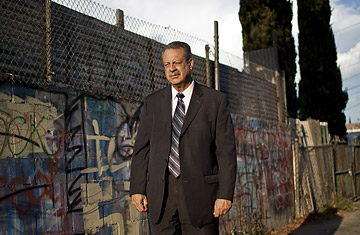
(7 of 7)
Spriggs flew to L.A. on July 2 and gave Lonnie's address to Kilcoyne--with strict instructions that he and his men shouldn't go near Christopher. What they needed was a DNA sample from Lonnie. It was July 4 weekend, but Kilcoyne pulled in dozens of detectives on overtime to follow the suspect. "Within several hours, I had 22 detectives surveilling Lonnie, following him everywhere, waiting for him to toss a cigarette butt or a soda can or even spit in the street," Kilcoyne says. He was almost certain they had found the Grim Sleeper, but until they had Lonnie's DNA, "you had to keep one small window of doubt open."
On Monday, Lonnie went into a pizza parlor, and a quick-thinking detective donned a hat and an apron and made himself a temporary busboy. They got his DNA off a napkin and a piece of pizza crust, and at 7 a.m. on Wednesday, July 7, Kilcoyne got a call from the lab to say the DNA was a perfect match. He called his undercover officers who were watching the house and told them to make the arrest. He also put in a call to Spriggs. "Hey," Kilcoyne said when she picked up, "this thing works."
Lonnie Franklin was indicted by a grand jury in March on 10 counts of murder and one count of attempted murder. He denied all the charges. Franklin's lawyer, Louisa Pensanti, says the defense will question the DNA and ballistic evidence and will be particularly aggressive in challenging the familial-DNA-search technique on privacy grounds. "That begs to be litigated," she says.
The Grim Sleeper's one known survivor, Enietra Washington, says as soon as she saw Franklin in the courtroom in March, she recognized him. "It all flashed back," she says. "His hair had changed a bit, but the face was the same." After the arrest, the cops played a tape of the 911 call reporting Barbara Ware's murder to Franklin's neighbors on 81st Street. Everyone who heard the tape, according to the cops, said it sounded like Franklin.
Already three other states--Colorado, Texas and Virginia--have allowed familial DNA searches. Only two jurisdictions, Maryland and the District of Columbia, have expressly ruled them out. A bill permitting the FBI to perform familial searches of its nationwide DNA database was introduced in Congress last year but never made it out of committee. Privacy advocates and law-enforcement experts will be watching closely to see what kind of challenge to familial DNA Franklin's lawyers can mount in the trial and how the judge will respond. Appeals are likely, no matter the outcome. Because Franklin has been charged with 10 unconnected murders and one attempted murder, the case is not expected to go to trial until at least 2013.
At the beginning of November, the LAPD announced it had linked Franklin to six more murders and one more attempted murder but would not be charging him with the additional crimes for the time being, to avoid slowing down the current proceedings. As the case inches toward trial, it comes to rest on an irony likely to become more common in forensics labs and criminal courtrooms: the alleged killer was ultimately unmasked because his DNA linked him both to a person to whom he gave life and those whose lives he took away.
